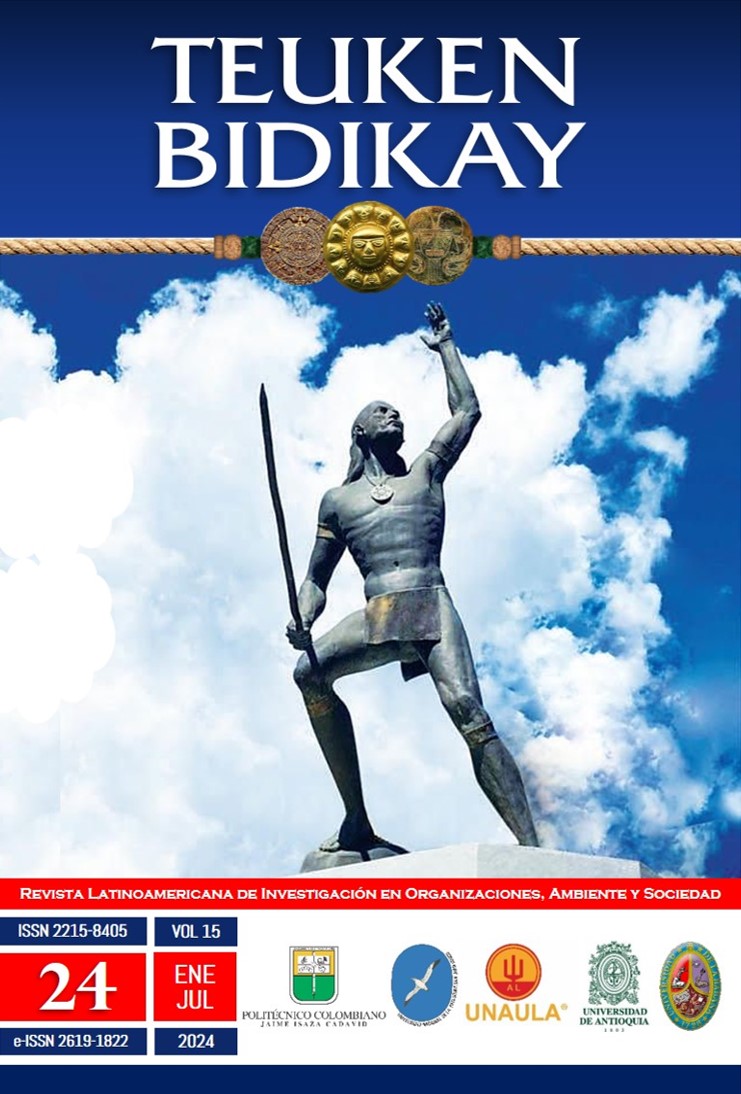MEANINGS OF SPIRITUAL EXPERIENCES IN THE ORGANIZATIONAL AND WORK WORLD
DOI:
https://doi.org/10.33571/teuken.v15n24a5Keywords:
spirituality, spirituality at work, experiences of spiritualityAbstract
This article aims to present the results of a qualitative study, type descriptive-interpretative, based on semi-structured interviews that conducted with various workers from different companies in the city of Medellín, through which was possible to characterize the meanings of spirituality experiences in the context of organizational and work. The results allowed us to conclude that spirituality allows, and fosters multiple well-being experiences for people; in addition, it helps them to understand emotions and manage states of stress and disturbance; and finally, it helps to find meaning in what they do, and experiencing connection with their community, and with their team’s job. As a result, spirituality at work is experienced as a force that provides motivation and energy, and allows people to self-actualize and feel that they transcend.
Article Metrics
Abstract: 296 PDF (Español (España)): 127PlumX metrics
References
Alonso, L. y Escorcia, I. (2003). El ser humano como una totalidad. Salud Uninorte, 17, 3-8. https://rcientificas.uninorte.edu.co/index.php/salud/article/view/4163
Assagioli, R. (1996). Psicosíntesis: ser transpersonal. Gaia ediciones.
Bourdieu, P. (1997). Capital cultural, escuela y espacio social. Siglo XXI
Briceño, J., Cañizales, B., Rivas, Y., Lobo, H. Moreno, E., Velásquez, I. y Ruzza, I. (2010). La holística y su articulación con la generación de teorías. Educere, 14(48), 73-83. http://erevistas.saber.ula.ve/index.php/educere/article/view/13432
Bruce, W. (2000). Spirituality in public service. International Journal of Organizational Theory and Behavior, 3, 599-632. https://doi.org/10.1108/IJOTB-03-03-04-2000-B015 DOI: https://doi.org/10.1108/IJOTB-03-03-04-2000-B015
Brussat, F. & Brussat, M. (1996). Spiritual literacy: Reading the sacred in everyday life. Touchstone.
Cervantes, C. (Ed.). (2011). Espiritualidad y política. Kairos
Chiavenato, I. (2002). Gestión del Talento Humano. Me Graw Hill.
Dehler, G. & Welsh, M. (1994). Spirituality and organizational transformation: Implications for the new management paradigm. Journal of Managerial Psychology, 9(6), 17-26. https://doi.org/10.1108/02683949410070179 DOI: https://doi.org/10.1108/02683949410070179
Dehler, G. & Welsh, M. (2003). The experience of work: spirituality and the new workplace. In R. Giacalone & C. Jurkiewicz, (Eds.). Handbook of workplace spirituality and organizational performance (pp. 108–122). M.E. Sharpe.
Dejours, C. (1994). Sofrimento, prazer e trabalho. En Conferencias brasileras. FGV.
D’Bruyne, P., Herman, J. y de Schoutheete, M. (1974). Dinámica de la investigación en Ciencias Sociales. Prensa Universitaria de Francia.
Gonzales-Rey, F. (2006). Investigación cualitativa y subjetividad. Odhag.
Hernández, R., Fernández, C. y Batista, M. (2010). Metodología de la investigación. McGraw Hill.
Jurkiewicz, C. & Giacalone, R. (2004). Values framework for measuring the impact of workplace spirituality on organizational performance. Journal of Business Ethics, 49(2), 129-142. https://www.springerprofessional.de/en/a-values-framework-for-measuring-the-impact-of-workplace-spiritu/6276666 DOI: https://doi.org/10.1023/B:BUSI.0000015843.22195.b9
King, S. & Nicol, D. (1999). Organizational enhancement through recognition of individual spirituality: Reflections of Jaques and Jung. Journal of Organizational Change Management, 12(3), 234-242. DOI: https://doi.org/10.1108/09534819910274026
Marteau, S. y Perego, L. (2018). La Organización desde el paradigma holístico. Ciencias Administrativas, (11), 55-63. https://doi.org/10.24215/23143738e021 DOI: https://doi.org/10.24215/23143738e021
Max-Neef, M. (1986). Desarrollo a Escala Humana: una opción para el futuro. CEPAUR.
Myss, C. (2018). Anatomía del espíritu. Penguin Random House Grupo Editorial.
Neck, C. & Milliman, J. (1994). Thought self-leadership: Finding spiritual fulfillment in organizational life. Journal of Managerial Psychology, 9(6), 9-16. https://doi.org/10.1108/02683949410070151 DOI: https://doi.org/10.1108/02683949410070151
Orejuela, J. (2020). Investigar sin angustia: guía práctica para pasar del problema de investigación al análisis de datos bajo una lógica matricial. https://www.eafit.edu.co/investigacion/noticias/PublishingImages/Paginas/en-la-u-se-estudia-la-ciencia-de-investigar/investigar-sin-angustia-la-ciencia-de-investigar.pdf
Orejuela, J., Malvezzi, S., Vásquez, A. & Mendes, A. (2020) The Clinics of Work: An Alternative Vision of Occupational Health. International Journal of Psychological Research. 13(2), 109-117. https://doi.org/10.21500/20112084.4737 DOI: https://doi.org/10.21500/20112084.4737
Otzen, T. y Manterola, C. (2017). Técnicas de muestreo sobre una población a estudio. Int. J. Morphol. 35(1), 227-232. http://dx.doi.org/10.4067/S0717-95022017000100037 DOI: https://doi.org/10.4067/S0717-95022017000100037
Petchsawanga, P. & Duchon, D. (2009). Measuring workplace spirituality in an Asian context. Human Resource Development International. 12(4), 459-468. http://dx.doi.org/10.1080/13678860903135912 DOI: https://doi.org/10.1080/13678860903135912
Quecedo, R. y Castaño, C. (2002). Introducción a la metodología de investigación cualitativa. Revista de Psicodidáctica, (14), 5-39.
Sarmiento, H. (2008). Retorno a la Idea. Elementos Metodológicos para la Construcción de Conceptos Propedéuticos de Investigación Contable. Revista Lúmina, 8, 43-57. https://doi.org/10.30554/lumina.08.1184.2007 DOI: https://doi.org/10.30554/lumina.08.1184.2007
Spradley, J. (1979). The Ethnographic Interview. Holt, Rinehart and Winston.
Teasdale, W. (1999). The mystic heart. New World Library.
Downloads
Published
How to Cite
Issue
Section
License
Copyright (c) 2024 Hernán Felipe Monsalve Ospina, Johnny Javier Orejuela Gómez

This work is licensed under a Creative Commons Attribution-NonCommercial-ShareAlike 4.0 International License.


























